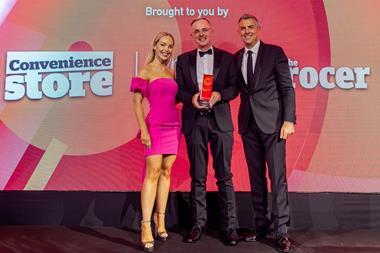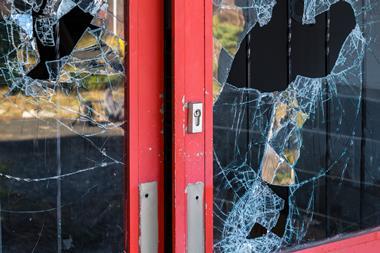From clever merchandising to bollards outside the store, our C-Store Champions explain their strategies for dealing with retail crime
Barrie Seymour, Londis Littletown, West Yorkshire
Barrie says his cigarette cage has been his best security investment, especially since a spate of thefts sent his insurance policy sky-rocketing
Julian Taylor-Green, Spar Lindford, Hampshire
CCTV is crucial, according to Julian, enabling him to nail the shoplifters and provide police with the evidence they need for a conviction
Mohammad Afzal, Nisa Local, Oxford
Clever store design and merchandising have reduced crime at Mohammad’s store to the odd shoplifting incident
Jonathan James, owner of James Convenience Retail, which comprises 105 stores
Jonathan ensures his staff know how to diffuse tricky situations and avoid putting themselves at risk
What are the most common types of crime you encounter?
Barrie: Other than shoplifting, we had two ram raids and one break- in over quite a short space of time about five years ago. First, we had a four-wheel drive come through the front, which made a complete mess. They took all the cigarettes worth about £7,000. In the following six months we had a break-in where someone smashed the window and got under the shutter, cut the glass with a glass cutter and took the till drawers and about £300. They were disturbed by the bread man so didn’t make off with a lot. We bricked up that window. Then the following year, which I really didn’t expect, they put a four-wheel drive through the other window, which had a seven-metre fridge full of food the other side. They rammed it again and again and pushed the fridge into the aisle. That caused about £21,000-worth of damage and they made off with about £6,500-worth of cigarettes. I got a call at 3am and went to see the store with a huge hole in the front. It was snowing that day.
Julian: Theft and verbal abuse. We had a spate of thefts about five weeks ago in which we found a lot of our security-tagged spirits kept going missing. These thieves used high-strength magnets to get the tags off and sold them on Ebay. It took about a week before we could work out who was doing it and deal with it.
Mohammad: I’ve been here a long time – more than 31 years – and we are at a stage where we do not have major crime going on. The main crime we experience now is petty crime such as shoplifting. When we first came here it was different, but the crime rate is generally better now because we’ve routed out the big crime. We’ve controlled who is coming into our shop by changing the items we sell. For example, we used to sell strong lager, but we found the people who came in to buy that were often aggressive, so we stopped selling that. We also have the store laid out in a way that nothing is hidden and so it’s hard to pocket something secretly.
Jonathan: Shop theft is the key one. Historically, the same as every-one else in retail, we’ve had internal theft issues. That’s a common problem, although many people wouldn’t like to admit it. Another issue is abusive behaviour from customers and attempted proxy purchasing of alcohol.
How do these crimes affect you, your staff and business in the short and long term?
Barrie: After the third incident I was tempted to give it up. I had had enough. I struggled to get insurance. My insurance premium went from £884 to £5,320. That was really shocking and terrible to deal with. There was food everywhere and condiments all smashed across the floor and I’m allergic to vinegar, so it really wasn’t good for me! My friends came, just as they did with the break-in, and boarded up the window for me, and I was trading again the next day. I’ve had to put up bollards all around the front of the store, which look awful. I’m in a really nice area and the shop now looks like it’s in the Bronx. It’s such a shame. I loved it all being open and having window displays. My insurance has just come down to normal again five years later. It was £5,000, then £4,000, then £3,000 and now it’s £1,200.
Julian: With the thefts, it took up a lot of our time to have to keep stock-checking and trying to reduce the window in which we thought thefts were taking place so we could then go back through the CCTV and catch the perpetrator. Going through CCTV footage can take hours. This sort of thing can affect the mood of the whole team as no one likes to feel like they can’t trust the people walking into the store. It makes the staff feel a bit apprehensive. After finally catching the people who did it and getting the police to give them a slap on the wrist and banning them from the store, we now have to trawl through hours of CCTV to provide the police with as much evidence as possible so they can prosecute them.
Mohammad: Financially it affects us, of course, but because they are not big thefts, the staff are not usually badly affected.
Jonathan: It’s very distressing, really. It can be very frustrating for the staff if they are not allowed to tackle an abusive customer issue themselves. From the staff morale side of things, too, it’s not great. I suppose the other thing is when you get shop losses it’s easy to look internally and start pointing fingers, which isn’t nice for the staff. The sad thing is that abusive behaviour from customers becomes like an everyday occurrence when you work in retail. Under normal circumstances that sort of behaviour could be quite upsetting, but you do become hardened to it over time.
Do you have a particular way that you deal with shoplifters?
Barrie: Basically, catch them in the store and call the police and don’t let them leave until the police get here to take them away. We had a young lad come in just the other day. We knew he’d come back, because these kids get greedy and they always come back. He did return and started at it again and we called the police and made him stay until they got here.
Julian: We just have to try to build as much evidence as possible to prove what they did and when so that we can give this to the police and they will take us seriously. The police officers have told us to call 999 and not to try to deal with thieves ourselves, but I know if I call that number I have to try to get past the control desk, and the person on the phone may not think your issue is as serious as the police officers who have told you they want you to call them.
Mohammad: In most cases we tend to deal with them ourselves. We catch them and tell them not to come back, and it works. Once they are banned here they are soon banned from the Tesco Express opposite us and then they have no reason to come to this area at all.
Jonathan: We had a particular shoplifter who was banned from every shop in the city eventually. I personally tackled him one day. He became extremely abusive and aggressive. When I was running forecourts I tried to approach a man who was stealing fuel and he drove at me on the forecourt. I reported it to police as a shop theft but they were happy to deal with it as an attempted murder. He went to prison for a lesser charge in the end.
Do you think the local police and other agencies are supportive when it comes to business crime?
Barrie: We don’t do too badly with the police. We don’t have any problems with them. We do also use a convenience retail Whatsapp group, which shares useful information.
Julian: I would say I find our relationship with them frustrating. Just today they came in wanting to look at our CCTV footage because of an incident that happened outside our store yesterday. I don’t have time to go through it with them. When we want their support it’s quite difficult to get, but when they want ours they expect us to drop everything. The other issue is that no one is taking responsibility for the fundamental issue behind the thefts, which is drug addiction.
Mohammad: Police don’t take petty crimes to court. I wouldn’t say they are unhelpful, but they are under a lot of pressure and they aren’t always able to come when you call them. I find it easier to deal with thieves myself; it’s less stressful and drawn out that way. Mostly, I help the police because I have CCTV outside the store.
Jonathan: Yes, especially when there’s violence involved. They don’t tend to jump on shop thefts, but they have to prioritise the aggravated issues.
What security measures do you have in store?
Barrie: We now have ram bollards, extended wings on the shutters so you can’t pull them up, a cage over the cigarettes and a 16-camera CCTV unit.
Julian: CCTV internally and externally, microphones at the counter, bollards outside, steel doors and an alarm system.
Mohammad: We have CCTV inside and out. That’s 14 cameras and three monitors – one in the shop, one in the office and one upstairs, where my son lives. We don’t have shutters. We must be one of the only shops not to, but sometimes if you let people know you are not scared of them then that helps as well. We are open and transparent and give our customers respect, and they are respectful in return. It helps to break down barriers between you and the customers and build relationships with them.
Jonathan: All the stores have CCTV. Some have tags on products and barriers at the door. We defensive merchandise as well, so if we know a particular product is likely to be stolen then we might replace it or simply put less out on the shelf.
How do you train staff to deal with criminal activity or threatening behaviour?
Barrie: We don’t get much threatening behaviour. I would just say to staff to be calm and try to calm the person down and get them out of the shop. If they were really threatened I would say to point out the CCTV cameras.
Julian: We have regular training with the staff, especially around mid-September when the nights start to draw in. We make them aware of when they are most vulnerable and tell them to use the panic alarm if needed.
Mohammad: From my own experience I can give them advice. I tell them to remain calm and don’t get physical, stay behind your barrier, and be firm, but polite.
Jonathan: The aim is to get them out of the shop as quickly as possible. We try to ensure our staff can placate people, but if it’s alcohol or drug-fuelled abuse then it can be difficult to deal with.
If a c-store retailer was to install just one security measure, which do you think is most essential?
Barrie: The cigarette cage, without a shadow of a doubt.
Julian: CCTV that you can monitor remotely from your mobile phone or laptop. It’s important to be able to check up on the shop when you aren’t there.
Mohammad: CCTV is essential. I would also say to try to keep an open store without lots of items built up high. And be respectful to customers and look after them.
Jonathan: CCTV is definitely important and the one security measure I must have in every store.
How much did your security measures cost to set up?
Barrie: The bollards cost about £4,000 and took about a week to install, but they were worth the money considering what we had been through. The cigarettes cage was the best investment, though. That cost only £500 and it works really well and protects very valuable items.
Julian: The most expensive security measure for us has been the CCTV system as we have 32 cameras. It cost £5,000-£6,000. They say prevention is better than cure so it’s good to have cameras in every aisle and screens at the counter to make people aware that staff can see all areas of the shop at all times.
Mohammad: The CCTV system cost about £2,000, maybe a bit more. I installed that a long time ago now. It didn’t cost much for what it does.
Jonathan: The CCTV systems vary from £2,000 to £10,000, depending on the size of the store.
The C-Store Champions are a group of experienced retailers who understand the role of the local store in their community. They are tuned into the demands and desires of their customers and believe in continual development of their businesses. Each month the Champions share their expertise
















![C-Store_Champions_logo-CHOSEN[1] 2023](https://d2dyh47stel7w4.cloudfront.net/Pictures/380x253/6/5/7/301657_cstore_champions_logochosen12023_817064.jpg)




1 Readers' comment